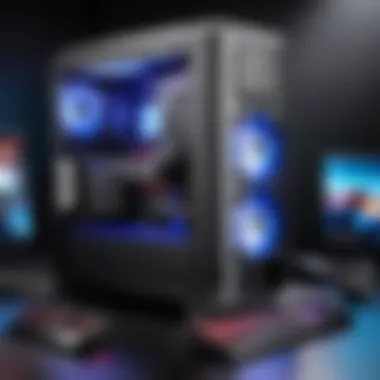A Comprehensive Guide to Choosing the Best PC for Gaming and Streaming Purposes


Esports Coverage
When considering the optimal PC for gaming and streaming, it is vital to delve into the world of esports coverage. Pro-gaming tournaments serve as a pinnacle where the finest gamers showcase their skills and push hardware to its limits. Player profiles and interviews offer insights into the preferences of top professionals, shedding light on hardware choices and performance expectations. Additionally, exploring team strategies and analysis provides a glimpse into the tactical aspects of gaming, highlighting the importance of seamless hardware integration for competitive play.
Hardware Testing
To ensure the best PC for gaming and streaming, thorough hardware testing is essential. This includes in-depth reviews of gaming monitors, analyzing factors such as refresh rates, resolution, and color accuracy to optimize the visual experience. Performance analysis of GPUs is crucial, examining benchmarks, thermals, and power efficiency to determine the best fit for gaming and streaming requirements. Comparisons of mechanical keyboards focus on key switch types, actuation force, and durability, offering insights into the tactile feedback and responsiveness necessary for a seamless gaming experience.
Game Reviews
Stay informed about the latest game releases to tailor your PC setup effectively for upcoming titles. Detailed gameplay analysis provides an understanding of technical demands, such as frame rates and rendering capabilities, guiding hardware choices for optimal performance. Evaluating storyline and graphics reviews helps in assessing the visual and narrative aspects of games, ensuring that your PC can deliver an immersive gaming and streaming experience.
Understanding the Requirements for Gaming and Streaming PCs
In the realm of gaming and streaming, the significance of selecting the right PC cannot be overstated. The efficiency and performance of a PC are critical for creating high-quality gaming content or smooth streaming experiences. Key Factors to Consider within this context encompass Processor Performance, essential for seamless multitasking and robust performance; Graphics Card Capabilities, crucial for rendering detailed graphics in games and streaming applications; and RAM and Storage Requirements, fundamental for storing data and running multiple programs concurrently. Understanding these elements is paramount to optimizing the gaming and streaming experience.
Key Factors to Consider
Processor Performance
When it comes to Processor Performance, the focus lies on the processing power of the CPU. A high-performing processor ensures swift execution of tasks, enabling seamless gameplay and streaming without lags or delays. Processors with multiple cores enhance multitasking capabilities, while clock speed influences the speed of task completion. Opting for a processor renowned for its reliability and efficiency is advantageous, as it guarantees top-notch performance for gaming and streaming setups.
Graphics Card Capabilities
Graphics Card Capabilities play a pivotal role in delivering stunning visuals for gaming and streaming endeavors. A powerful graphics card with ample GPU memory capacity ensures smooth rendering of graphics-intensive games and streaming applications. Additionally, the integration of Ray Tracing Technology enhances visual realism and immersion in gameplay, elevating the overall user experience. Investing in a graphics card known for its stellar performance and cutting-edge features is a wise choice for enhancing visual quality.
RAM and Storage Requirements
RAM and Storage Requirements are vital aspects that influence the speed and efficiency of a gaming and streaming PC. Ample RAM ensures smooth operation of multiple programs simultaneously, reducing lags and enhancing overall performance. Choosing between Solid-State Drive and Hard Drive involves weighing the benefits of faster access speeds versus larger storage capacities. Balancing these requirements is essential to meet the demands of modern gaming and streaming applications.
Importance of Connectivity Options
Within the gaming and streaming landscape, Connectivity Options play a pivotal role in establishing seamless communication and data transfer. Networking Capabilities ensure stable internet connections for lag-free online gaming and smooth streaming experiences. On the other hand, Peripheral Connectivity facilitates the integration of various peripherals such as controllers, webcams, and microphones, enhancing user interaction and streaming capabilities. Prioritizing robust connectivity options is vital for ensuring uninterrupted gameplay and streaming sessions.
In this article, we will delve into the crucial aspects of selecting an optimal PC tailor-made for gaming and streaming enthusiasts. From hardware essentials to performance considerations, you will acquire invaluable insights to facilitate informed decisions when investing in a gaming and streaming rig.
Choosing the Right Components for Gaming and Streaming
When it comes to building a PC for gaming and streaming, selecting the right components is paramount. Each element plays a vital role in the overall performance and functionality of the system. From processors to graphics cards, every choice influences the gaming and streaming experience.


Selecting the Ideal Processor
The processor is the brain of your PC, determining how well it can handle gaming and streaming tasks. Multi-Core Performance is a crucial aspect to consider, as it dictates the CPU's ability to multitask efficiently. Additionally, Clock Speed Considerations impact how fast data is processed, directly affecting overall system speed and responsiveness.
Multi-Core Performance
Multi-Core Performance involves the processor's capability to execute multiple operations simultaneously, enhancing performance when running multiple applications or tasks. Its benefit lies in optimizing workload distribution across cores, leading to smoother multitasking and improved overall system efficiency. Despite its advantages, managing heat dissipation and software optimization are essential to maximize the benefits of multi-core architecture.
Clock Speed Considerations
Clock Speed is the rate at which a processor can complete tasks, influencing how swiftly data is processed. Higher clock speeds result in faster computations, beneficial for tasks requiring quick data manipulation. However, balancing power consumption and cooling solutions is necessary when opting for higher clock speeds to prevent overheating and ensure system stability.
Optimal Graphics Card Selection
The graphics card is pivotal for rendering visual content in games and streams. GPU Memory Capacity determines how much data the GPU can handle at once, affecting the rendering of complex textures and scenes. Ray Tracing Technology enhances lighting and reflection effects, elevating visual realism and immersion in games and streams.
GPU Memory Capacity
GPU Memory Capacity dictates the graphics card's ability to handle high-resolution textures and complex visuals, impacting gaming and streaming quality. Choosing a card with ample memory ensures smooth rendering of intricate scenes and prevents lag during gameplay or streaming sessions. Despite the advantages, higher memory capacity cards can be costly and may not always be fully utilized for standard gaming or streaming tasks.
Ray Tracing Technology
Ray Tracing Technology simulates the behavior of light in real-time, creating lifelike lighting effects and reflections in games and streams. Its advantage lies in elevating visual fidelity and realism, enhancing the overall gaming and streaming experience. While resource-intensive, ray tracing technologies showcase next-level graphics but may require substantial processing power and system optimization to function seamlessly.
Determining RAM and Storage Needs
RAM and storage are crucial for multitasking, storing game data, and running streaming software efficiently. RAM Speed and Capacity impact how quickly data can be accessed and processed, while the choice between Solid-State Drive (SSD) and Hard Drive (HDD) influences storage speed and reliability.
RAM Speed and Capacity
RAM Speed directly affects how swiftly data can be retrieved and processed, enhancing system performance during multitasking or memory-intensive tasks. Opting for higher RAM capacities allows for smoother multitasking and improved task-switching efficiency, ideal for seamless gaming and streaming experiences. However, balancing cost and necessity is key, as excessive RAM can be underutilized, impacting overall system value.
Solid-State Drive vs. Hard Drive
The choice between SSDs and HDDs centers on storage speed, durability, and capacity needs. SSDs excel in speed and reliability, offering quick data access and transfer rates critical for gaming and streaming applications. On the other hand, HDDs provide larger storage capacities at a lower cost, suitable for long-term data storage but may result in slower loading times and system responsiveness.
Factors Influencing Motherboard Choice
The motherboard's role in a gaming and streaming build is pivotal, as it facilitates component connectivity and system functionality. Compatibility with Components ensures seamless integration of CPU, GPU, and other hardware components, while Expansion Options enable future-proofing and customization.


Compatibility with Components
A motherboard's compatibility with components is crucial for ensuring a smooth and stable system operation. Choosing a motherboard that supports your CPU and GPU ensures optimal performance and reduced compatibility issues. Additionally, selecting a motherboard with sufficient connectivity options and slots for future upgrades enhances system versatility and longevity.
Expansion Options
Motherboards with expansive expansion options offer room for system growth and customization. Having additional PCIe slots, RAM slots, and storage connectors enables users to upgrade their system with new hardware or features easily. While versatile, the downside includes potential compatibility constraints and increased component costs when utilizing various expansion options.
Enhancing Performance and Functionality
In this segment of the comprehensive guide to selecting the best PC for gaming and streaming, we delve into enhancing performance and functionality. When considering an efficient PC setup, enhancing performance is crucial for delivering top-tier gaming and streaming experiences. This section explores various elements and considerations that play a vital role in optimizing the overall performance and functionality of your system.
Overclocking Potential for Enhanced Performance
Benefits of Overclocking
Overclocking stands out as a key strategy for boosting PC performance. By increasing the clock speed of your processor beyond its default settings, you can achieve higher speeds and improved performance in demanding tasks such as gaming and streaming. One of the main benefits of overclocking is the ability to extract extra computing power from your hardware, leading to enhanced speed and responsiveness. However, it's important to note that overclocking may void warranties and increase power consumption, so stability and cooling solutions are crucial considerations.
Considerations for Stability
Stability is paramount when overclocking your system. While overclocking can provide performance benefits, it may also lead to system instability if not managed correctly. Factors such as temperature control, voltage regulation, and system monitoring play a critical role in ensuring a stable overclock. It is essential to strike a balance between performance gains and system reliability to avoid potential hardware damage and data loss. By considering stability alongside performance improvements, you can optimize your system for seamless gaming and streaming experiences.
Choosing an Efficient Cooling Solution
Liquid Cooling Systems
Liquid cooling systems offer an efficient solution for managing high levels of heat generated by overclocked components. By utilizing liquid coolant to dissipate heat from key hardware components, such as the CPU and GPU, these systems help maintain optimal temperatures during intensive tasks. The key advantage of liquid cooling is its superior heat dissipation capabilities compared to traditional air cooling methods. However, liquid cooling setups may require regular maintenance and monitoring to prevent leaks and ensure continued effectiveness.
Thermal Paste Application
Applying thermal paste plays a critical role in ensuring effective heat transfer between a CPU or GPU and its corresponding cooling solution. Proper application of thermal paste helps fill microscopic gaps between the processor and heatsink, facilitating efficient heat dissipation. The unique feature of thermal paste lies in its ability to improve thermal conductivity, thereby reducing operating temperatures and enhancing overall system stability. However, incorrect application or inadequate coverage of thermal paste can lead to overheating issues and diminished performance.
Importance of Power Supply Unit (PSU) Selection
Wattage Requirements
Selecting the appropriate wattage for your power supply unit is vital for the stability and performance of your PC. Wattage requirements vary based on the components within your system, with high-powered GPUs and CPUs necessitating higher wattages. Choosing a PSU with adequate wattage ensures reliable power delivery to all components, reducing the risk of system crashes or hardware damage. It is essential to consider future upgrades and expansion when determining the appropriate wattage for your PSU.
Modular vs. Non-Modular PSUs


The choice between modular and non-modular PSUs pertains to the flexibility and cable management of your system. Modular PSUs allow you to detach unused cables, enhancing airflow and aesthetics within your PC case. In contrast, non-modular PSUs feature fixed cables, which may lead to clutter and hinder airflow. While modular PSUs offer customization options, they tend to be pricier than their non-modular counterparts. Understanding the benefits and trade-offs between these PSU types is essential for optimizing your PC's power supply solution.
Optimizing Peripherals for Gaming and Streaming
Gaming Mouse and Keyboard Choices
Selecting the right gaming mouse and keyboard is essential for maximizing comfort and performance during gaming and streaming sessions. Key characteristics to consider include ergonomic design, programmable buttons, and customizable lighting options. A high-quality gaming mouse and keyboard can enhance your gameplay experience by providing precise control and responsive input. However, personal preferences and gaming genres may influence your choice of peripherals, so it's crucial to prioritize comfort and functionality when making your selection.
Dual Monitor Setup Considerations
Integrating a dual monitor setup into your gaming and streaming environment offers increased screen real estate and multitasking capabilities. Dual monitors allow you to concurrently display game footage, streaming software, chat interfaces, and other content, maximizing productivity and immersion. Considerations such as display resolution, refresh rates, and mounting options play a role in optimizing the usability and efficiency of your dual monitor configuration. By evaluating your workflow and content requirements, you can leverage the benefits of a dual monitor setup to elevate your gaming and streaming experiences.
Software Considerations for Gaming and Streaming PCs
In the realm of gaming and streaming PCs, software considerations play a pivotal role in enhancing performance and ensuring seamless operation. As technology evolves, selecting the right software components becomes increasingly crucial to meet the demands of modern gaming and streaming. By focusing on key software aspects, users can optimize their setup for maximum efficiency and effectiveness. Understanding the nuances of software elements is vital for creating a robust gaming and streaming environment.
Operating System Selection
When it comes to choosing an operating system (OS) for gaming and streaming, the debate between Windows, Mac OS, and Linux is a perennial one. Each OS brings unique features and functionalities to the table, catering to different user preferences and requirements. Windows is renowned for its widespread compatibility with gaming software, offering a vast library of games to enthusiasts. MacOS, on the other hand, is favored for its sleek design and seamless integration with Apple hardware. Linux stands out for its open-source nature and customization options, appealing to tech-savvy users looking for flexibility and security.
Compatibility with Gaming Software
The compatibility of an operating system with gaming software is a crucial factor to consider when building a gaming and streaming PC. Windows boasts broad compatibility with a plethora of games, thanks to its market dominance in the gaming sphere. Mac OS, although catering to a smaller pool of titles, provides a smooth and optimized gaming experience for Apple aficionados. Linux, known for its niche gaming community, offers compatibility with select game titles and a platform for indie developers to thrive. Understanding the compatibility of your chosen OS with gaming software is essential to ensure a seamless gameplay experience.
Optimizing Streaming Software Performance
Efficient streaming software performance is paramount for content creators and gamers looking to share their gameplay with an audience. OBS Studio Configuration is a popular choice among streamers for its versatile settings and customization options. Streamers can fine-tune their stream quality and optimize performance for a seamless broadcasting experience. Additionally, Streamlabs OBS Setup Tips provide invaluable insights into enhancing stream quality, engaging viewers, and managing overlays effectively. By optimizing streaming software performance, content creators can deliver high-quality streams and captivate their audience with engaging content.
OBS Studio Configuration
OBS Studio Configuration offers a myriad of settings and tools to customize your streaming setup to perfection. From adjusting stream bitrate and resolution to implementing scene transitions and audio filters, OBS Studio empowers streamers with a comprehensive suite of features. With proper configuration, streamers can achieve professional-looking streams with minimal technical glitches, ensuring a smooth viewing experience for their audience.
Streamlabs OBS Setup Tips
Streamlabs OBS (SLOBS) is a user-friendly streaming software that combines functionality with simplicity, making it an ideal choice for new and experienced streamers alike. With its intuitive interface and pre-set themes, SLOBS simplifies the streaming process, allowing users to focus on content creation rather than technical complexities. Setup tips for Streamlabs OBS cover aspects such as widget customization, alert settings, and optimized streaming settings, enabling streamers to personalize their stream and engage viewers effectively.
Anti-Virus and Security Software Recommendations
Securing your gaming and streaming PC from potential threats is imperative to safeguard sensitive data and ensure system integrity. Opting for reliable security suite options adds an extra layer of protection against malware, viruses, and cyber-attacks. While security suites may impact system performance to some extent, the peace of mind gained from robust security measures outweighs any minor slowdowns. By choosing the right security software, users can mitigate security risks and enjoy a worry-free gaming and streaming experience.
Security Suite Options
Selecting a suitable security suite is a critical decision for fortifying your gaming and streaming setup against cyber threats. Leading security software providers offer comprehensive solutions that include antivirus, firewall, and real-time threat detection capabilities. Evaluating factors such as performance impact, update frequency, and additional features can help in selecting the ideal security suite for your specific needs. With the right security suite in place, users can protect their system from online threats and maintain a secure computing environment.
Impact on System Performance
While security software is essential for protecting your system, it is essential to consider its potential impact on system performance. Some security suites may utilize system resources, leading to minor slowdowns during intensive gaming or streaming sessions. However, the trade-off between security and performance is a delicate balance that users must navigate. By selecting a security suite that strikes a harmonious balance between robust protection and minimal performance impact, users can enjoy a secure computing environment without compromising on gaming and streaming performance.



